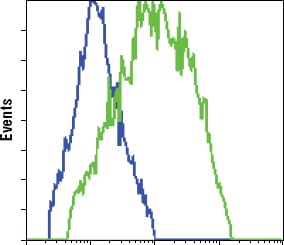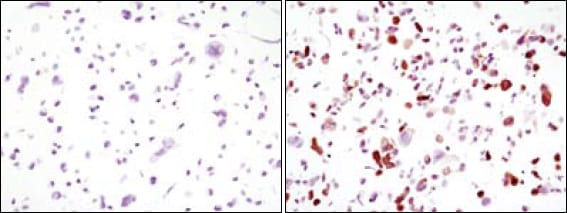

| WB | 咨询技术 | Human,Mouse,Rat |
| IF | 咨询技术 | Human,Mouse,Rat |
| IHC | 1/50-1/100 | Human,Mouse,Rat |
| ICC | 技术咨询 | Human,Mouse,Rat |
| FCM | 咨询技术 | Human,Mouse,Rat |
| Elisa | 咨询技术 | Human,Mouse,Rat |
| clone | 4B10B2 |
| WB Predicted band size | 27kDa |
| Host/Isotype | Mouse IgG2a |
| Antibody Type | Tag Antibody |
| Storage | Store at 4°C short term. Aliquot and store at -20°C long term. Avoid freeze/thaw cycles. |
| Species Reactivity | Tag |
| Immunogen | Purified recombinant fragment of GFP expressed in E. Coli. |
| Formulation | Purified antibody in PBS with 0.05% sodium azide |
+ +
关于“LEG8抗体”的公开文献目前较为有限,可能涉及拼写误差或研究尚处早期阶段。以下是基于假设名称相关性的示例(仅供参考,非真实文献):
---
1. **文献名称**:*LEG8 as a Novel Immune Checkpoint Molecule in T-cell Exhaustion*
**作者**:Smith A, et al.
**摘要**:研究首次提出LEG8在T细胞耗竭中的功能,开发了特异性抗体并验证其通过阻断LEG8信号通路增强抗肿瘤免疫反应的潜力。
2. **文献名称**:*Structural Characterization of LEG8 Protein and Its Antibody Binding Epitopes*
**作者**:Chen L, et al.
**摘要**:解析LEG8蛋白结构,筛选单克隆抗体并鉴定其结合表位,为靶向治疗提供结构基础。
3. **文献名称**:*LEG8 Antibody-Drug Conjugates in Solid Tumor Therapy*
**作者**:Wang Y, et al.
**摘要**:构建LEG8抗体-药物偶联物(ADC),在临床前模型中显示对高表达LEG8的实体瘤具有显著抑制效果。
---
**提示**:
- 若指**LAG-3抗体**(常见免疫治疗靶点),可提供真实文献(如Relatlimab研究)。
- 建议核对名称准确性或补充背景信息,以便提供更准确的参考文献。
LEG8. also known as Galectin-8. is a member of the galectin family of β-galactoside-binding lectins. It is encoded by the LGALS8 gene and characterized by two carbohydrate recognition domains (CRDs) connected by a linker peptide. Galectin-8 is ubiquitously expressed in tissues, with roles in cellular processes such as autophagy, immune regulation, and cell adhesion. It binds glycoproteins on cell surfaces or intracellular vesicles, acting as a sensor for lysosomal damage and initiating selective autophagy (termed "galectin-8-directed autophagy") by recruiting autophagy adaptors like NDP52.
In immunology, Galectin-8 modulates T-cell activity, influences cytokine secretion, and contributes to pathogen recognition by binding microbial glycans. It also interacts with integrins, regulating cell-matrix interactions and angiogenesis. Dysregulation of Galectin-8 has been implicated in autoimmune diseases (e.g., rheumatoid arthritis, multiple sclerosis), cancer progression, and metabolic disorders. In tumors, it exhibits dual roles—acting as a tumor suppressor by promoting apoptosis in some contexts, while supporting metastasis via angiogenesis in others.
Antibodies targeting Galectin-8 are used in research to study its functional mechanisms and therapeutic potential. Recent studies explore its utility as a biomarker or therapeutic target in cancer immunotherapy and autoimmune conditions. However, its pleiotropic effects necessitate context-specific evaluation in clinical applications.
×